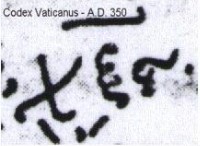dzheremi
Coptic Orthodox non-Egyptian
- Aug 27, 2014
- 13,897
- 14,169
- Country
- United States
- Gender
- Male
- Faith
- Oriental Orthodox
- Marital Status
- Private
Gentle reminder. Islam is a demonic religion.
Islam denies that Jesus is the son of God. It denies that he died on the cross.
In Islamic prophecy, there is the future arrival of the Mahdi and Jesus. This Jesus is Islamic. The (Islamic) Mahdi looks a lot like the Antichrist, and the (Islamic) Jesus looks a lot like the false prophet.
The Mahdi and the Antichrist - YouTube
The mark of the beast looks a lot like the name of Allah in Arabic with two crossed swords underneath:
The Path to 666 | Christian Forums

The Path to 666
A lot of people think Jesus will come back before 2050. I tend to think around 2040. That's just 17 years. Are we just going to sit around for 10 years, then suddenly for no apparent reason the Antichrist just takes over? Or is a lot of stuff...www.christianforums.com
Oh Lord, not this again...

I first dealt with this idea a decade ago or more on the now-defunct Catholic Answers Forums, when it was first posted there, and the long and short of it is that the Arabic script does not work that way. You cannot shift it around, change the direction in which it is read, add or delete any given letter (etc., etc.) until you get to something looks enough like "666" to you to get your weirdo pseudo-'Bible Code' type theory to sort of work. الله is "God" in Arabic. Whatever that video or blog makes out of it is not.
Also, this is a horrible offense to the millions of Christians found across the MENA region and in the diaspora of MENA people who worship Christ our God with His good Father and the Holy Spirit in the Arabic language. Since I'm one of them, at least whenever I have the opportunity to attend liturgy (since we do not completely eschew Arabic even in places where it is not traditionally spoken, because we're still a very young church in the west, and are still actively receiving immigrants from the Middle East for whom Arabic is their mother tongue), I feel the need to point out that Christians have been worshipping God in the Arabic language since long before anyone was doing so in anything that we would recognize as English, since even the oldest evidence we have of Old English does not predate the Anglo-Saxon settlement of Britain in the 5th century AD, whereas Arabs are specifically listed as among those present on the day of Pentecost who heard the message in their own language (Acts 2:11). The rise of Islam some seven centuries later does not retroactively change any of that. Islam is really a non-entity when it comes to Arabic-speaking or even wider MENA Christianity, in that while it presented a somewhat unique challenge during its expansion over the formerly Christian territories of the region (mostly because of its rapid speed, rather than any kind of religious genius like what is often attributed to Muhammad by useful idiots who do not know about all the sources he cribbed from), it did not somehow change what we would argue or how we would do so. Witness, for instance, that the earliest extant Arabic-language apology for Christianity (c. 750 AD, which predates even the translation of the scriptures into that language) is customarily given the translated titled "On the Triune Nature of God" for what is in the original written as في تثليت الله الواحد Fī tathlīth Allāh al-wāḥid.
Upvote
0


